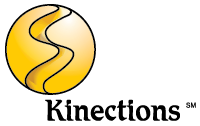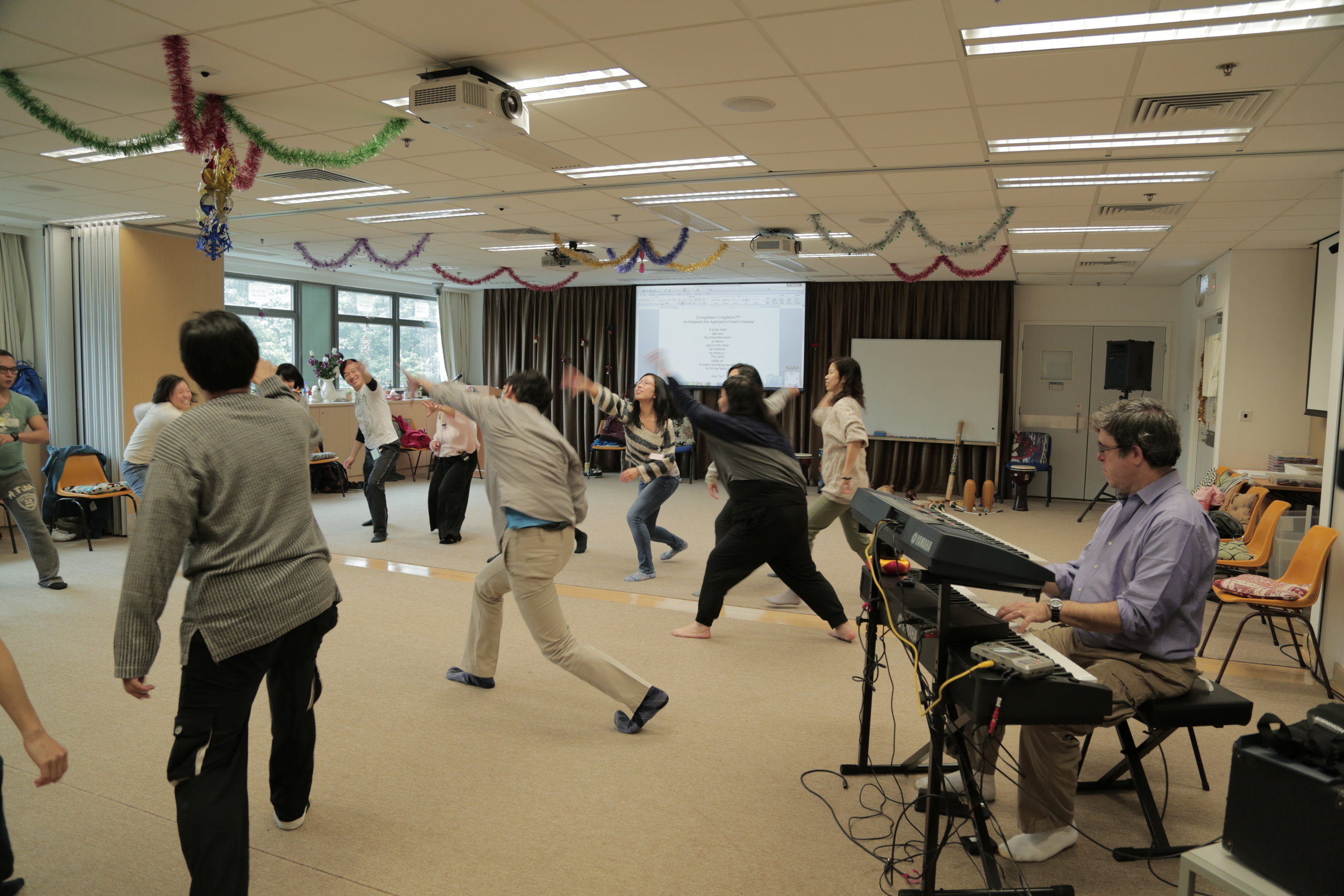Frequently Asked Questions (FAQs)
The Alternate Route To Certification in Dance/Movement Therapy
What is the alternate route to certification in dance/movement therapy (DMT)?
The American Dance Therapy Association (ADTA) has two levels of certification. The R-DMT, the first level of certification, attests to a person’s education. It calls for a master’s degree, substantive training in DMT, kinesiology, and a range of courses in psychology and counseling. The second level, BC-DMT, attests to a person's continuing education and experience, supervised and independent.
To help people who want to become dance/movement therapists but cannot leave their homes or work to pursue a master’s degree in DMT, the ADTA developed the alternate route. It allows aspiring dance/movement therapists to take courses from Board Certified DMTs who offer the courses in places other than the six university-based master’s degree programs currently approved.
Kinections is the only free standing institute in the country that offers all the dance/movement therapy (DMT) courses both required for certification and also approved by the ADTA.
What is the difference between going to graduate school in dance/movement therapy and pursuing the alternate route in dance/movement therapy at Kinections?
There are differences. Students who attend a full-time program in DMT receive masters' degrees in DMT or creative arts therapies. Students who pursue the alternate route at Kinections in order to become registered dance/movement therapists must have or must seek masters' degrees in a related area. Related areas may include counseling, social work, psychology, dance, education, etc.
Alternate route students who wish to become National Certified Counselors or National Certified Mental Health Counselors must have masters' degrees in mental health.
Have the courses at Kinections been approved by the American Dance Therapy Association?
Dr. Fraenkel, founder and director of Kinections, spearheaded the development of the guidelines for approving courses during her tenure as chair of the ADTA Credentials Committee. Students can be sure, therefore, that all the DMT courses at Kinections have been developed and approved in accordance with the guidelines of the American Dance Therapy Association.
How many dance/movement courses do I need to take?
Dance/Movement Therapy Theory and Practice
—18 credits, 270 hours
Movement Observation and Analysis
— 6 credits, 90 hours
Group Processes in DMT
— 3 credits
Kinesiology
— 1 credit, 15 hours. Kinections prefers that students take our 3 credits, 45-hour course. Both options are available.
What does it cost to take a course at Kinections?
$475 per credit. A 2-credit course (30 hours) is $950; a 3-credit course (45 hours) is $1,425. Other classes are pro-rated accordingly. These rates compare more than favorably with equivalent courses at other institutions.
May I take classes on line?
Yes. To help students who cannot attend live classes, we have been offering “hybrid” classes since 2011 and fully online classes since 2020.
What is a hybrid course?
“Hybrid” courses combine on-line classes and a residential component at Kinections. Students who miss any virtual classescan listen to the podcasts of each class.
What do you mean when you refer to podcasts?
We record all the on-line classes. Students who miss one or more classes and students who have attended the on-line classes can listen to the podcasts of each class as often as they wish to do so.
Who teaches the courses?
Our faculty is more than fully qualified. Most have years of teaching and clinical experience as well as national and international reputations. Many have published articles, written or contributed chapters to books, and presented at professional conferences,.
How long are the courses at Kinections?
In-person courses are 2-7 days long depending on the subject matter. Most are taught at Kinections in Rochester, New York, but we also teach in other places in the United States and across the globe when invited to do so. Virtual classes
What other courses are required for the R-DMT level of certification?
Applicants for the R-DMT must also complete course work in research design and methodology, abnormal psychology or psychopathology, developmental psychology, group theory and processes, and at least two electives chosen from the following courses: theories of therapy and counseling, methods of psychotherapy or counseling, therapeutic intervention, diagnostic methodology, systems theory, and neuroscience. Most applicants have taken, or will take, these courses in their masters degree programs.
What do I have to do to join the next cohort of students?
Kinections has rolling admissions. and reviews and accepts applications throughout the year. If you are applying for admission to the 2023 cohort of students, we recommend that you apply as soon as possible. Enrollment is limited and we have already accepted a number of people.
To request your application, please call or write to us.
What if the course I apply for is already full?
Once a class is full, accepted applicants are placed on a waiting list.
May I take alternate route courses in dance/movement therapy at Kinections if I have already taken alternate route courses with people who are not affiliated with Kinections?
Yes, however, you will have to submit, along with our regular application, a detailed list of the courses you have taken and the topics covered in them. We want to ensure that you are enrolling in courses for which you are adequately prepared.
I want to go to graduate school in dance/movement therapy. May I take kinesiology at Kinections since the school says it is a pre-requisite?
Yes. Assuming we accept your application, you many take as many or as few courses at Kinections as you wish as long as their are openings in the class. However, fully enrolled students receive priority.
I hear the practicing dance/movement therapists take courses at Kinections? Why would working clinicians want to take courses designed for the alternate route?
According to our evaluations practicing dance/movement therapists take courses at Kinections' because they are high level courses that include a wide range of readings and experiential learning activities, provide traditionally untaught or innovative approaches to dance/movement therapy and are grounded in current research. In addition, practicing dance/movement therapists get the opportunity to study with nationally and internationally known clinicians.
Evaluations frequently comment on the joy of taking a class at Kinections and feeling professionally nurtured. Working clinicians bring a level of professionalism that comes from experience and the ability to present actual case studies. Students bring wonder and a lack of pre-conceptions. Combine experience and wonder with thoughtful teaching and you get creative learning. Evaluations from student and practicing dance/movement therapists alike consistently praise the new information, methods and perspectives they have received.
May I take alternate route courses at Kinections if I am already enrolled in a graduate DMT program?
Yes, many matriculated graduate students in dance/movement therapy come to Kinections. They do so for a variety of reasons. The two most frequent relate to the opportunity to (1) study with our distinguished faculty and (2) fill in the gaps they see in their education, e.g. some programs do not offer group processes in dance therapy every year and most do not offer kinesiology.
I am a National Certified Counselor and want to become a dance/movement therapist. May I apply the alternate route courses I take to the required 100 hours of continuing education NBCC requires for re-certification?
Yes. Kinections is an NBCC approved provider (#5767) of continuing education.
Can I apply the courses at Kinections to my required hours of continuing education?
Yes, if you are referring to accruing CE hours for the R-DMT, BC-DMT, NCC, NCMHC, and New York State’s LCAT. If you are referring to the continuing education requirements of your state licensure board or another organization, you ought to check first. Be sure to let them know that Kinections is an NBCC-Approved Continuing Education Provider and may offer NBCC-approved clock hours for events that meet NBCC requirements.(ACEP™#5767). Kinections Creative Arts Therapies is recognized by the New York State Education’s Department’s State Board for Mental Health Practitioners as an approved provider of continuing education for licensed creative arts therapists (#CAT-0033).
Can I apply LivingDance~LivingMusic(LD~LM) seminars like the one in Corfu, Greece to my alternate route program?
Yes, LivingDance~LivingMusic seminars have been pre-approved by the ADTA as meeting requirements for the Alternate Route R-DMT level of credentialing. LD~LM Theory Method, and Experience provides 3/18 credits required for the DMT Theory & Practice category. Group Processes in LivingDance provides 2/3 required credits for the Group Processes in DMT category.
Can I apply LivingDance~~LivingMusic workshops to my required 100 hours of continuing education (CE)?
Yes, if you are referring to accruing CE for the R-DMT, BC-DMT, NCC, NCMHC, and the LCAT. If you are referring to the CE requirements of your state licensure board or another organization, check with them. Be sure to let them know that Kinections is an NBCC approved provider of continuing education (#5767) and that New York State Education’s Department’s State Board for Mental Health Practitioners recognizes Kinections Creative Arts Therapies as a provider of continuing education by (#CAT-0033) for licensed creative arts therapists
©2018 Kinections Creative Arts Therapies

